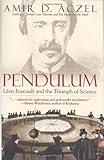Pendulum : Léon Foucault and the triumph of science
Material type: TextPublication details: Atria Books, New York, 2003.Description: x, 275 pages: illustrations; 23 cmISBN:
TextPublication details: Atria Books, New York, 2003.Description: x, 275 pages: illustrations; 23 cmISBN: - 9780743464789
- 530.092 ACZ
| Item type | Current library | Collection | Call number | Status | Date due | Barcode |
|---|---|---|---|---|---|---|
 Books
Books
|
Symbiosis Institute of Business Management - Hyderabad General | General Book | 530.092 ACZ (Browse shelf(Opens below)) | Available | SIBMH-B-4256 |
Browsing Symbiosis Institute of Business Management - Hyderabad shelves, Shelving location: General, Collection: General Book Close shelf browser (Hides shelf browser)
"In 1851, struggling, self-taught physicist Lǒn Foucault performed a dramatic demonstration inside the Panthǒn in Paris. By tracking a pendulum's path as it swung repeatedly across the interior of the large ceremonial hall, Foucault offered the first definitive proof -- before an audience that comprised the cream of Parisian society, including the future emperor, Napoleon III -- that the earth revolves on its axis. In this book, Amir Aczel has revealed the life of a gifted physicist who had almost no formal education in science, and yet managed to succeed despite the adversity he suffered at the hands of his peers. Foucault gave us the modern electric compass, devised an electric microscope, invented photographic technology, and made remarkable deductions about color theory, heat waves, and the speed of light. Yet until now so little has been known about his life. Pendulum tells of the illustrious period in France during the Second Empire; of Foucault's relationship with Napoleon III, a colorful character in his own right; and -- most notably -- of the crucial triumph of science over religion."










There are no comments on this title.